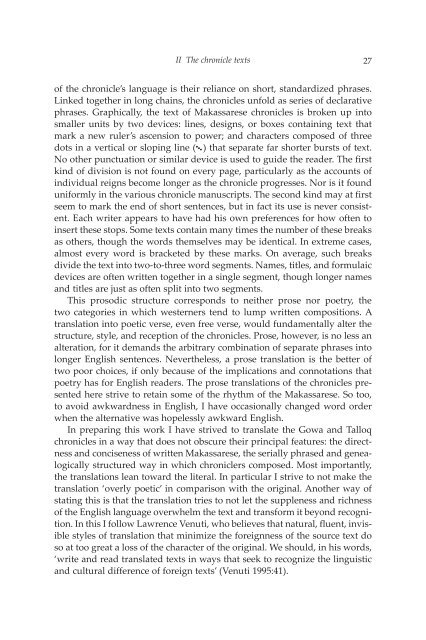A CHAIN OF KINGS - Books and Journals
A CHAIN OF KINGS - Books and Journals
A CHAIN OF KINGS - Books and Journals
Create successful ePaper yourself
Turn your PDF publications into a flip-book with our unique Google optimized e-Paper software.
II The chronicle texts 27<br />
of the chronicle’s language is their reliance on short, st<strong>and</strong>ardized phrases.<br />
Linked together in long chains, the chronicles unfold as series of declarative<br />
phrases. Graphically, the text of Makassarese chronicles is broken up into<br />
smaller units by two devices: lines, designs, or boxes containing text that<br />
mark a new ruler’s ascension to power; <strong>and</strong> characters composed of three<br />
dots in a vertical or sloping line (.) that separate far shorter bursts of text.<br />
No other punctuation or similar device is used to guide the reader. The first<br />
kind of division is not found on every page, particularly as the accounts of<br />
individual reigns become longer as the chronicle progresses. Nor is it found<br />
uniformly in the various chronicle manuscripts. The second kind may at first<br />
seem to mark the end of short sentences, but in fact its use is never consistent.<br />
Each writer appears to have had his own preferences for how often to<br />
insert these stops. Some texts contain many times the number of these breaks<br />
as others, though the words themselves may be identical. In extreme cases,<br />
almost every word is bracketed by these marks. On average, such breaks<br />
divide the text into two-to-three word segments. Names, titles, <strong>and</strong> formulaic<br />
devices are often written together in a single segment, though longer names<br />
<strong>and</strong> titles are just as often split into two segments.<br />
This prosodic structure corresponds to neither prose nor poetry, the<br />
two categories in which westerners tend to lump written compositions. A<br />
translation into poetic verse, even free verse, would fundamentally alter the<br />
structure, style, <strong>and</strong> reception of the chronicles. Prose, however, is no less an<br />
alteration, for it dem<strong>and</strong>s the arbitrary combination of separate phrases into<br />
longer English sentences. Nevertheless, a prose translation is the better of<br />
two poor choices, if only because of the implications <strong>and</strong> connotations that<br />
poetry has for English readers. The prose translations of the chronicles presented<br />
here strive to retain some of the rhythm of the Makassarese. So too,<br />
to avoid awkwardness in English, I have occasionally changed word order<br />
when the alternative was hopelessly awkward English.<br />
In preparing this work I have strived to translate the Gowa <strong>and</strong> Talloq<br />
chronicles in a way that does not obscure their principal features: the directness<br />
<strong>and</strong> conciseness of written Makassarese, the serially phrased <strong>and</strong> genealogically<br />
structured way in which chroniclers composed. Most importantly,<br />
the translations lean toward the literal. In particular I strive to not make the<br />
translation ‘overly poetic’ in comparison with the original. Another way of<br />
stating this is that the translation tries to not let the suppleness <strong>and</strong> richness<br />
of the English language overwhelm the text <strong>and</strong> transform it beyond recognition.<br />
In this I follow Lawrence Venuti, who believes that natural, fluent, invisible<br />
styles of translation that minimize the foreignness of the source text do<br />
so at too great a loss of the character of the original. We should, in his words,<br />
‘write <strong>and</strong> read translated texts in ways that seek to recognize the linguistic<br />
<strong>and</strong> cultural difference of foreign texts’ (Venuti 1995:41).









![Am HaSefer [Volk des Buches] - Books and Journals](https://img.yumpu.com/20648352/1/174x260/am-hasefer-volk-des-buches-books-and-journals.jpg?quality=85)







